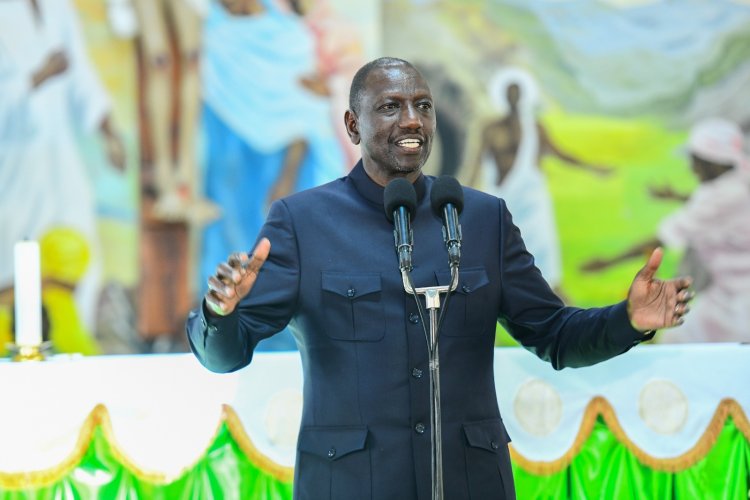Ruto Abolishes 5-Year Ban On Logging
Going forward, he announced that those who import furniture will have to pay tax since he wants furniture made within the country.

President William Ruto on Sunday, July 2 announced the government's decision to lift the nationwide ban on logging for the first time in five years.
Speaking after attending a church service at St Marys Catholic Church in Molo, Nakuru County, the Head of State revealed that the decision to scrap the ban was motivated by the need to open up the economies of areas that depend on forest products.
Ruto alleged that mature trees were decaying in forests, causing hardships among locals who rely on forest produce to earn a living, poking holes in the country's move to import timber.
Going forward, he announced that those who import furniture will have to pay tax since he wants furniture made within the country.

President William Ruto waters a seedling in Molo, Nakuru County on July 2, 2023. /PCS
"Trees are decaying in the forest and people are struggling to get timber. Do you see the foolishness?
"We have lifted the ban so that we can harvest mature trees. Whoever imports furniture will be taxed because we want all that to be made in the country," he stated.
Ruto accused the previous government of intending to import furniture after imposing the ban, stating that the decision to raise the levy on imported furniture was made to ensure that it is manufactured locally and that Kenyans are employed.
"This is why we have decided to open up the forest and harvest timber so that we can create jobs for our youth and open up business while we continue with our plan to plant 15 billion trees in 10 years," added Ruto.
Ruto's government is aiming to hit the tree-planting target across the country in a bid to restore forest cover by 2032.
On Saturday, July 1, he led a tree planting exercise in Elgeyo Marakwet, Trans-Nzoia and Uasin Gishu Counties. Nakuru residents, he noted, are expected to plant at least 650 million trees.
The decision to lift the ban on logging followed multiple complaints from residents of Molo, Elburgon and Njoro sub-counties who were mainly supported by the timber industry.
Principal Secretary for Forestry Ephantus Kimotho in May revealed that the logging ban would be lifted in order to pave the way for planting trees in government forests.
“We have exotic trees which are normally harvested upon reaching their maturity stage and those are the ones whose ban will be lifted so that others can immediately be planted during this rainy season,” Kimotho said.
The multi-billion dollar industry has been one of Kenya's best employers over the past 10 years, especially for uneducated youth in urban areas.
Several areas in the South Rift, including Elburgon, Molo and Total areas in Nakuru and Maji Mazuri in Eldama Gorge, depended on the timber industry, with youth hired as loaders, tree cutters (power saw operators), transporters and millers, and others did manual work such as clearing the milling areas.
Over the past six years, the impact of the logging ban was felt particularly in the towns, which initially enjoyed a vibrant economy based on the lucrative timber industry, specifically the towns of Elburgon and Molo from the 1990s which enjoyed a boom in timber trade to become strongholds of timber business in the South Rift region.
A moratorium on logging has been in place since February 2018, following a public outcry over illegal logging, which has been blamed for declining water levels in the country's main rivers.
A recent study by the Kenya Forestry Research Institute (KEFRI) found that Kenya Forestry Services lost Ksh4 billion in revenue and 44,000 jobs over the past five years following the ban on logging in public and community forests.


 admin
admin 




